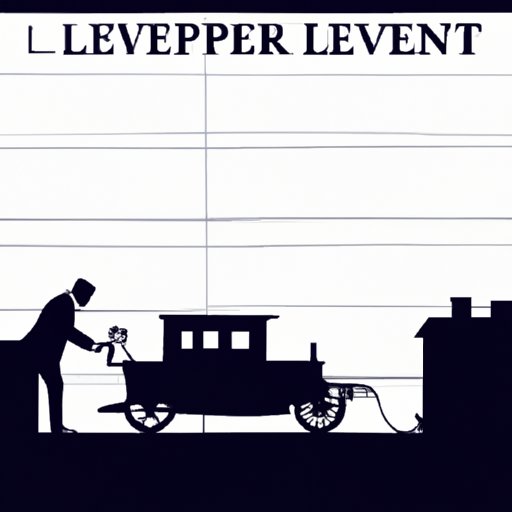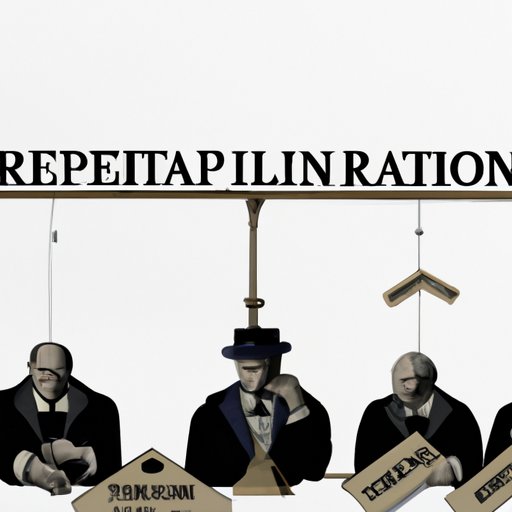Introduction
The Great Depression was one of the most devastating economic events in history. It began in 1929 with a stock market crash that wiped out billions of dollars of wealth. In its wake, unemployment skyrocketed and global trade plummeted. While there were many contributing factors to the Great Depression, speculation played an important role. This article will explore how speculation led to the Great Depression by examining the role of excessive leverage, the causes and effects of speculation, and the political and regulatory failures that enabled it.
Historical Overview of Speculation and the Great Depression
Before exploring the role of speculation in the Great Depression, it is important to understand the historical context. Speculation involves taking risks in hopes of making a profit. During the 1920s, speculation was rampant in the United States. Investors used borrowed money to purchase stocks, thinking that the prices would continue to rise. They were encouraged by brokers and bankers who sought to make money from commissions. As more people became involved in the stock market, prices rose and the “roaring twenties” ensued.
However, the bubble eventually burst. On October 29, 1929, the stock market crashed. The Dow Jones Industrial Average fell almost 25 percent in one day. This was the beginning of the Great Depression. Millions of people lost their jobs, and the global economy went into a tailspin.

The Role of Excessive Leverage in Speculation and the Great Depression
Excessive leverage was a key factor in the speculation that led to the Great Depression. Leverage is the use of borrowed money to increase the potential return of an investment. In other words, it allows investors to buy more stocks than they could normally afford with their own money. During the 1920s, investors used leverage to buy stocks on margin, meaning they only had to pay a fraction of the cost upfront. This allowed them to buy more stocks, but it also increased their risk if the stock prices dropped.
The use of excessive leverage was a major contributor to the stock market crash of 1929. When the prices started to fall, investors were unable to pay back their loans. This caused banks to call in their loans and sell off the stocks, further driving down the prices. As the prices continued to drop, more investors were forced to sell their stocks, creating a downward spiral.
Causes and Effects of Speculation During the Great Depression
Speculation was an important factor in the lead up to the Great Depression. The widespread use of leverage and the expectation that stock prices would continue to rise encouraged people to take risks they otherwise would not have taken. Factors such as lax regulation, inadequate oversight, and a lack of transparency allowed speculation to run rampant.
The consequences of speculation during the Great Depression were severe. As the stock market crashed, so did the global economy. Unemployment soared, businesses closed, and people lost their homes and savings. The effects were felt around the world and lasted for several years.

Regulatory Failures in Speculation and the Great Depression
Regulatory failures were another contributing factor to speculation and the Great Depression. The Securities and Exchange Commission (SEC) was established in 1934 to regulate the securities markets. However, prior to this, there was little oversight or regulation of the stock market. Banks were allowed to offer risky loans without any limits, and brokers were able to promote speculative investments without providing accurate information or disclosing potential risks.
These regulatory failures enabled speculation to run rampant and contributed to the stock market crash of 1929. Without adequate regulation, investors were unaware of the risks they were taking and were unable to protect themselves when the market crashed.

Politics and Speculation in the Great Depression
Finally, politics played an important role in speculation and the Great Depression. The federal government had a laissez-faire attitude towards the stock market, believing that the market should be left alone to regulate itself. This attitude created an environment where speculation was encouraged and oversight was minimal.
The government also played a role in the aftermath of the crash. In an effort to stimulate the economy, the federal government implemented programs such as the New Deal and the Social Security Act. These programs provided relief to those affected by the Great Depression, but they also encouraged speculation by making it easier for people to borrow money and invest in the stock market.
Conclusion
Speculation was an important factor in the lead up to the Great Depression. Excessive leverage, regulatory failures, and politics all played a role in allowing speculation to run rampant. When the stock market crashed, the effects were felt around the world. To avoid a similar crisis in the future, it is important to ensure that regulations are in place to protect investors from taking risks they do not understand.
(Note: Is this article not meeting your expectations? Do you have knowledge or insights to share? Unlock new opportunities and expand your reach by joining our authors team. Click Registration to join us and share your expertise with our readers.)
